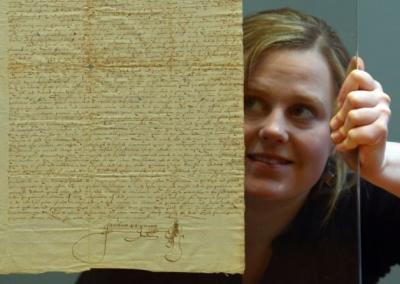Categories
MacGregor-Campbell feud manuscript to be auctioned

A 400 year old letter which tells the story of the notorious feud between the MacGregors and the Campbells is to be put up for auction - with a price tag of up to £3000. A proper piece of Scottish history.
The document is extremely delicate and the writing on it is hardly legible. It dates back to 1611 where it was issued by the Privy Council of Scotland, but actually originated from one of the most notorious members of the Campbell clan, Sir Duncan Campbell of Glen Orchy, who went by the nickname of “Black Duncan of the Cowl.”
The letter came in the wake of a proclamation from King James VI, who ruled over Scotland at the time and had knighted Sir Duncan, in 1590. The ruling effectively outlawed anyone being a member of the MacGregor clan and the document permitted the staging of court hearings to try its members. The MacGregors were outlawed for nearly 200 years after losing out in a power struggle with the Campbells over land in Argyll, which triggered a series of bloody battles.
The most famous MacGregor was Rob Roy MacGregor, born in 1671, he was forced to assume his mother’s surname of Campbell when he was born. The Royal edict against the clan was not to be lifted until more than a century later.
The document as part of the Breadalbane Collection, a gathering of documents relating to the Campbells of Glen Orchy, which is largely held by Edinburgh University.
Cathy Marsden, book specialist at Lyon & Turnbull said translations of the document from “Old Scots” highlighted the frustration of the Privy Council that some people had been protecting and supporting the interests of the clan, with a pledge to make an example of anyone that was brought to book.
She said: “As of 1603, the clan would be persecuted by law, and anyone bearing this name and refusing to renounce it would be put to death.
“Until the edict against the clan was repealed in 1774, it was illegal to be a MacGregor, or to protect or support the cause of those who held onto the name.
“It is very rare for something of this nature to come up for auction. We often get old title deeds and things like that, which are not particularly valuable, but documents like this, which relate to a really important part of Scottish history, don’t come up for auction that often.
“We’re expecting a lot of interest in it, perhaps from private buyers who are very interested in Scottish history and documents, or institutions like museums and archives who are interested in buying it on behalf of the nation.”
Topics:
Clan MacGregor, Clan Campbell

